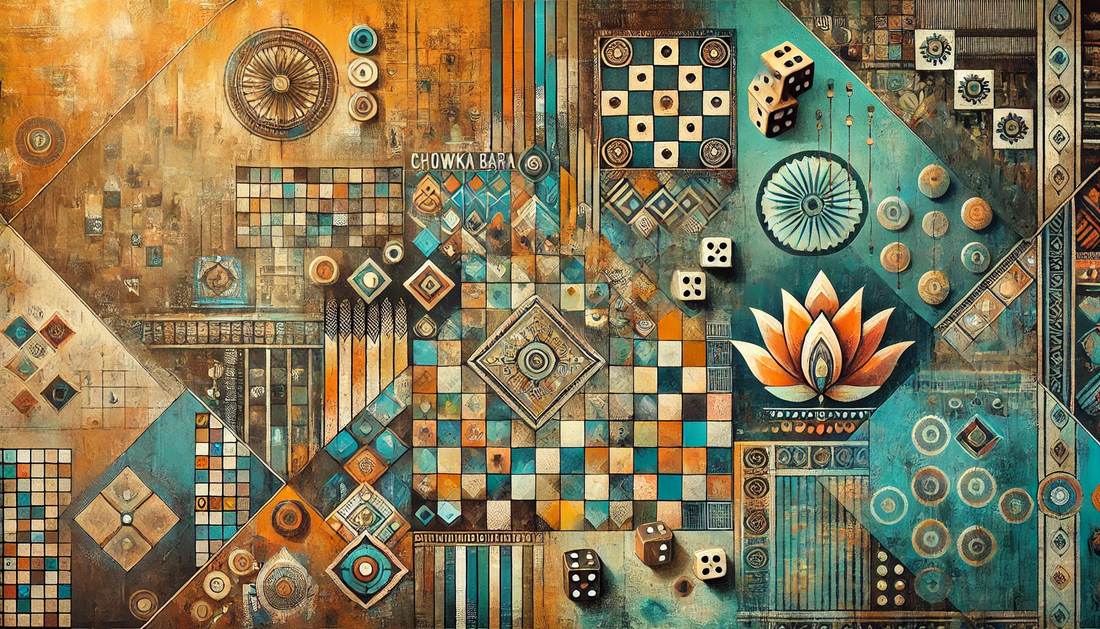
Timeless Wisdom on a Board: The Cultural Significance of Traditional Indian Games
Share
India, a land of diverse traditions and timeless wisdom, holds a treasure trove of traditional board games that are more than just tools for leisure. These games, steeped in history, reflect the country’s cultural values, social fabric, and philosophical underpinnings. From Chowka Bara to Pachisi, these age-old games embody lessons in strategy, teamwork, and life’s transience, making them an integral part of India’s cultural narrative.
A Glimpse Into the Past
Traditional Indian board games date back thousands of years, with archaeological evidence linking them to the Harappan Civilization (2600–1900 BCE). Games like Moksha Patam, which evolved into Snakes and Ladders, and Pagade, a precursor to modern-day Ludo, have been referenced in ancient texts such as the Mahabharata and the Manasollasa.
These games were not merely pastimes; they played a pivotal role in family bonding, community engagement, and imparting moral and spiritual lessons.
Reflection of Indian Philosophy
Many traditional board games symbolize the spiritual journey of life. For example:
Moksha Patam (Snakes and Ladders): Rooted in Jain and Hindu philosophy, this game represents the soul’s path to salvation. The snakes signify vices, while the ladders denote virtues.
Chaturanga (the precursor to Chess): Known for its emphasis on strategic thinking, Chaturanga mirrors the fourfold structure of Indian society: warriors, merchants, laborers, and ascetics.
These games encapsulate the cyclical nature of life, karma, and dharma, subtly reinforcing moral values through play.

Social and Educational Value
Traditional Indian board games were more than entertainment; they were tools for education and social interaction. Here’s how:
Skill Development: Games like Chowka Bara and Aadu Huli enhance strategic thinking, problem-solving, and hand-eye coordination. They require players to analyze, plan, and anticipate opponents’ moves.
Family and Community Bonding: In villages, people gathered around to play games such as Alaguli Mane (Mancala), fostering unity and intergenerational learning.
Cultural Transmission: These games were conduits for oral storytelling, sharing of folklore, and cultural values.
Relevance in Modern Times
In today’s digital age, traditional board games are experiencing a resurgence, thanks to their timeless appeal and relevance. Parents and educators are reintroducing these games to:
- Promote screen-free interaction.
- Instill values like patience, perseverance, and empathy.
- Celebrate cultural heritage.
Platforms like Roll the Dice offer meticulously crafted game sets, blending modern aesthetics with traditional gameplay. These initiatives aim to preserve and popularize India’s rich gaming heritage.
Global Influence of Indian Board Games
India’s traditional games have influenced recreational practices worldwide. For instance:
- Pachisi inspired Ludo, a household favorite globally.
- Chaturanga laid the groundwork for modern Chess, one of the most intellectually celebrated games.
- Gyan Chaupar (a variation of Snakes and Ladders) was adapted in England during the Victorian era as a morality game.
These global adaptations highlight the universal appeal and cultural significance of Indian board games.
Reviving a Heritage
The revival of traditional games is more than a nostalgic journey; it’s an essential step toward cultural preservation. Here are ways you can participate in this revival:
Introduce Traditional Games at Home: Replace screen time with engaging games like Chowka Bara or Navakankari to create meaningful family moments.
Support Local Artisans: Many traditional games are handcrafted by artisans. Buying these game sets supports local crafts and ensures the art form’s continuity.
Participate in Events: Platforms like Roll the Dice organize workshops and leagues that promote traditional games, making them accessible to new generations.
Traditional Indian board games are not just relics of the past; they are living embodiments of India’s cultural ethos, ready to inspire future generations. By embracing these games, we preserve a part of our identity, honor our ancestors’ wisdom, and bring communities closer.
Explore and experience the magic of these cultural gems with curated collections available on Roll the Dice. Whether you’re looking to rediscover your roots or introduce a rich heritage to your family, these games promise to be your perfect companion.
References:
- "The History of Chess: From Chaturanga to the Modern Game" - by Yuri Averbakh
- "Snakes and Ladders: Its Origin and Cultural Significance in India" - "Sahapedia"
- Roll the Dice - Traditional Indian Board Games
What’s your favorite traditional Indian board game? Share your memories and experiences in the comments below!
